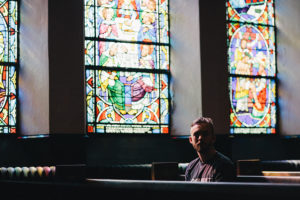Under a Spell: Faith vs. the Public Health Crisis
 Photo by Karl Fredrickson on Unsplash
Photo by Karl Fredrickson on Unsplash A pastor in Baton Rouge, Louisiana, decided the best remedy to a global pandemic is to continue to gather his congregation—despite federal guidelines, a state order banning groups larger than fifty (including churches), and evidence that preachers across the nation have switched to virtual services. According to the pastor, Rev. Tony Spell of the Life Tabernacle Church, the novel coronavirus is a mere political hoax. And no, he’s not alone; the dangers of this “spell” extend beyond this pastor and his church.
Rev. Spell led services at Life Tabernacle on March 17, with hundreds of churchgoers in attendance. Police arrived after and warned that the National Guard would be brought in to break up the next one (the National Guard later clarified this was not a plan). Then there’s Louisiana Governor John Bel Edwards’s milquetoast response. While discussing the option of sanctions and prosecution, though heavily emphasized as a last resort, the governor focused more on the possibility of the church willingly changing its practices—something that seems unlikely since Spell has boasted about the thousand-plus in attendance for last Sunday’s service, discussed plans to continue in-person services, and is encouraging other churches to do the same.
If a bar or music club held such a gathering, it’s owners would be sanctioned immediately, have their licenses revoked, and potentially face criminal charges. Yet this isn’t a commercial enterprise, some insist. (Considering the importance of in-person tithing, is it not?)
Everyone looks for a source of comfort and trust during a crisis, and places of worship can typically fill this role for the faithful. But the blatant disregard for public health exhibited in this case, when the coronavirus pandemic necessitates social distancing, is terrifying.
Considering that Spell’s parishioners are coming together in large groups at church and then encountering others in their neighborhoods, grocery stores, with food delivery, and so on, it’s clear the dangers of his actions extend far beyond his church.
Michigan Governor Gretchen Witmer issued an amendment to her executive order restricting gatherings to exclude places of worship. Any church, mosque, or synagogue may continue to have gatherings of any size without penalty. A Republican state representative from Pennsylvania is filing a bill that calls for prayer and fasting to atone for the sins she says brought on the coronavirus pandemic. These actions by governors, representatives, and preachers only reinforce avoiding necessary precautions to flatten the curve of COVID-19 contraction so that hospitals and medical professionals aren’t overwhelmed caring for the sick. Offsetting personal responsibility to place everything in the hands of one’s god is detrimental to public welfare.
Members of the clergy have a particularly strong fiduciary relationship with those they lead. Ministers, priests, rabbis, and imams are seen as authority figures and as holy, perhaps as having some dispensation or direct line to their god. If a member of the clergy is telling their congregation it’s not only okay to congregate, but that it’s what God wants, people are going to be inclined to ignore the expert advice of doctors and scientists and reasonable government guidelines.
It’s worth noting that most churches are protecting their congregations and neighborhoods by using virtual tools. However, it strikes me as highly problematic to suggest, as Rep. Clay Higgins (R-LA) has, that this is a constitutional issue and that the First Amendment’s free exercise clause gives religious groups the right to endanger the public health.
If you want to pray, pray from home. If you want to congregate, congregate online. If you want to help, donate; encourage good hygiene and social distancing amongst family and friends; and hold accountable people who, like Rev. Spell, willfully jeopardize the public welfare. And come election time, remember any mayor, governor, senator, representative, or president who downplays the severity of this situation, who removes personal responsibility because they say their faith will protect them, or who condones the actions of religious leaders like Spell.
In times of crisis, everyone needs a source of comfort and trust, but if we don’t vet what the sources are or what they are saying, the damage caused will not be limited to just the listeners: the damage will spread across the nation alongside the virus.
